
I’ve always held truck drivers in high regard. I’m not talking about pickup trucks. I mean the rolling mountains of steel that populate our highways and move the food and goods we need to stay alive from Point A to Point B. I suppose this is only natural given that my grandfather drove trucks for Consolidated Freightways for 15 years. I know it’s not an easy job.
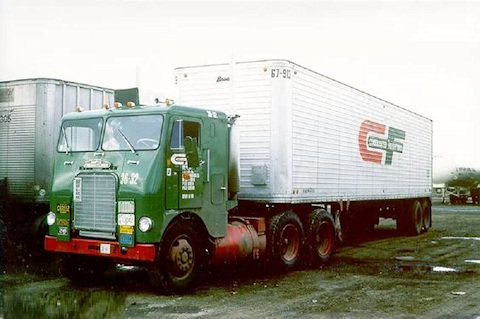
The image I have, and perhaps most people my age have, of the long-haul trucker is one of the lone White man spending countless hours staring out the elevated windshield looking to the horizon, or cursing as he frantically shifts gears to jake brake his rig before he flattens some moron who just cut him off in city traffic. Greasy diners, full ash trays, and the occasional stop at the payphone to call home and let the missus know where he was and when he hoped to be back, and no, he wasn’t going to be able to make Junior’s ball game this time.
Like I said, my grandfather was truck driver.
Maybe it’s a habit, a deep seated subconscious desire to see my grandfather again even though he left for the great highway in the sky many years back, but I tend to look up to see who is driving the rig when I speed past these rolling monsters (something my grandfather taught me: you are either in front of truck or behind it, but never on the side. If they have to come over, they will- whether you’re there or not).

So it has been with an increasing sense of befuddlement that recently (meaning in the last ten years or so) I’ve noticed less and less people who looked like my grandfather behind the wheel, and more people who look like Pedro, and Pajeet, and Mohammad. I didn’t spend much time on this, of course. I was busy driving. I take my driving seriously. Driving is a verb, not a passive experience one balances with their cell phone usage.
But I could not help but note that during the Biden Auto-Pen Years® (Registered Trademark Neo-Communists for a Weaker America, all rights reserved) one of the refrains used to justify the Great Brown Invasion was that there was a shortage of workers, the trucking industry included, and that non-residents were needed to fill these jobs.
This is generally bunk, but not entirely. It is more like a self-fulfilling prophecy: Truck driving was once a career path that allowed a person reasonably high pay and lifelong employment. Now, truckers make slightly more than half what they were being paid in the 1980s- prior to Reagan’s deregulation. This is one of the reasons fewer White men are willing to give their lives being truck drivers: it doesn’t pay. This, in turn, creates a need for more truck drivers. The law of supply-and-demand dictates that if there were a real shortage of truck drivers, wages would increase (instead of decrease): fewer workers means better pay for those willing to do the work. But this hasn’t happened. Instead, trucking firms, with the assistance of the Federal government, have helped foreign nationals to obtain CDLs and take-up the slack, thereby keeping wages suppressed and Whites out of the workforce, to the financial benefit of large trucking conglomerates who, in turn, donate to the political parties. You see the problem here.
Interestingly, and as an example of honest inquiry, I looked up the top-10 trucking firms in the US, suspecting anything this blatantly greedy had to be instigated by Jews. I was wrong. All of the firms, as near as I can tell, are manged by White men with non-Jewish backgrounds. Rather disappointing really. But, it should be noted, that the largest institutional shareholders of these conglomerates were the usual suspects: Vanguard, BlackRock, and State Street- with a few others thrown in for good measure.
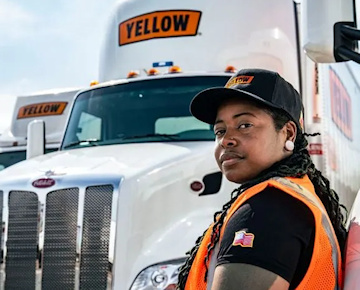
Of course, the Biden Auto-Pen had to take it one step further: in 2021 the Department of Labor and DOT partnered to launch the Driving Good Jobs initiative, which in part set out to “identify effective and safe strategies to get new entrants in the field from underrepresented communities, including women and young drivers between the ages of 18-20.” In other words, DEI Trucking.
This came on the heels of the Obamy administrations decision to remove the requirement to place drivers out of service for failing to meet English proficiency standards, further contributing to the road safety and national security issues in America’s trucking industry today. Who needs to be able to read the road signs and drivers’ manuals anyway? Interesting side note: a fully-loaded tractor-trailer can weigh as much as 80,000 pounds.
According to Shannon Everett of American Truckers United, “The American trucking industry is experiencing a replacement of the American truck driver with this new truck driver that is being brought into the country and being dumped in.” He goes on to explain that it is difficult for U.S. truck drivers to compete with foreigners from Eastern Europe and Asia and “all these places that are used to making third world living wages.”

To make matters worse, truckers interviewed by Blaze News said that many drivers are typically paid by the mile, meaning time spent waiting to load or unload is not compensated. Drivers lose $1.1 billion to $1.3 billion in earnings to this detention time. Consequently, many drivers are in a rush to get back on the road to make up for the lost wages, and possibly sacrificing safety for expediency once they are rolling. Dispatchers and brokers are pushing harder to deliver loads in a certain amount of time or else drivers face fines or deductions. The result? Drivers earn even less.
“If the wheels aren’t turning, the driver isn’t earning.”
In addition to lower wages, it has undermined the working conditions in the industry, leading to a higher turnover rate among truckers in general and White truck drivers in particular. The American Trucking Association’s own estimates place the turnover rate among drivers as high as 90%, meaning truckers sign with one carrier then leave the industry shortly thereafter, or move to a different carrier. Instead of a career path, it is becoming more akin to temporary work. This, too, is a safety issue for everyone on the road.
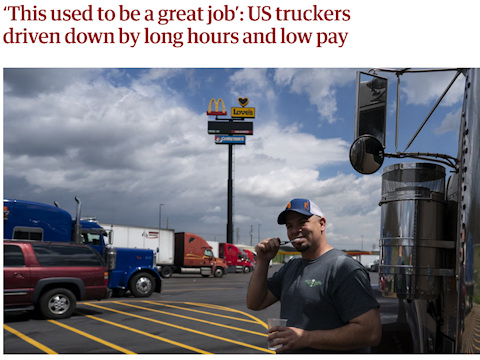
And the conditions drivers find themselves having to tolerate, which frankly were never that great to begin with, have become downright gross. The amount of hours a truck driver can drive in a day is highly regulated. They are permitted a maximum of 11 hours of driving time. This 11-hour limit can only begin after a driver has completed a minimum of 10 consecutive hours off duty. Furthermore, they are subject to a 14-hour duty window: meaning a driver is forbidden from driving after the 14th consecutive hour from when they started their shift. This 14-hour clock starts ticking the moment a driver begins any work-related activity and runs continuously, not pausing for breaks.
As one White trucker explained, “If you haven’t found a place to park by 2 or 3pm in a truck stop, you’re looking for any place to park, yet we’re fined and towed for just trying to be safe. When you have a 300-mile run and six to seven hours to be there, you don’t have time to waste, so either you’re late or you’re on time and refused use of the facilities. As nasty as it may sound, most of us experienced drivers carry garbage bags and a five-gallon bucket, or a potty chair with plastic grocery bags.”
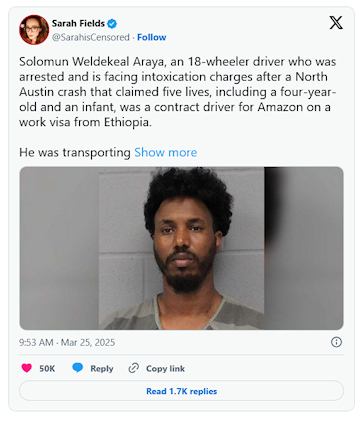
As Collin Long, the director of government relations for the Owner-Operator Independent Drivers Association, told Blaze News, “The real issue isn’t a shortage of drivers, it’s a shortage of drivers willing to stay in an industry that treats them like disposable labor…The big carriers prefer to churn through cheap, inexperienced drivers instead of investing in training and fair pay for professionals. It’s a dangerous business model that puts every family on the highway at greater risk. Experience leads to greater safety, and the churn-and-burn approach undermines both.”
And all this without even mentioning Ghost Carriers and No Name Given CDLs. We’ll save that for another time.
This just scratches the surface of the problems found in the trucking industry today, but it goes some way toward explaining why an increasing number of truck drivers no longer look like my grandfather. I still respect truck drivers generally. It’s not an easy job, and at least the people behind the wheel are trying to earn a living. But I don’t think it is too much to ask that the person responsible for the 80,000 pounds of rolling momentum on the same road as my daughter in her little Kia be an American citizen capable of reading English.
Finally, the problems in this industry also serve as a classic example of how things would be different under National Socialism: Given the important role truck drivers play in every aspect of our society, they would be honored with fair pay and decent working conditions and not treated like disposable cogs in the corporate machine, sacrificed on the alter of mammon.
Be safe out there.
Amerika Erwache!
SUBSCRIBE TO THIS BLOG
(It’s free, and mostly painless)
UPDATE: November 6, 2025
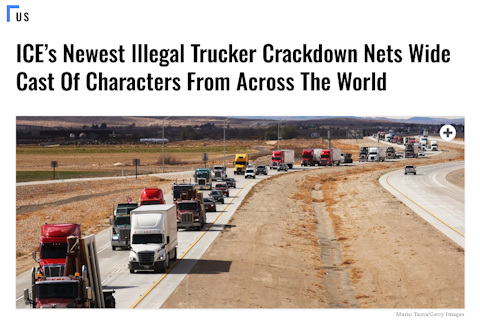
“Immigration and Customs Enforcement (ICE), working alongside the Oklahoma Highway Patrol, nabbed 70 illegal migrants along the I-40 interstate in late October, including 34 who were operating big-rig trucks in violation of state law, according to the agency. The massive bust follows an ongoing crackdown by the Trump administration against illegal migrant truck drivers. ” Story found here.
UPDATE: November 21, 2025: Interesting article/discussion with truck drivers highlighting the problem. Good read.


Leave a Reply